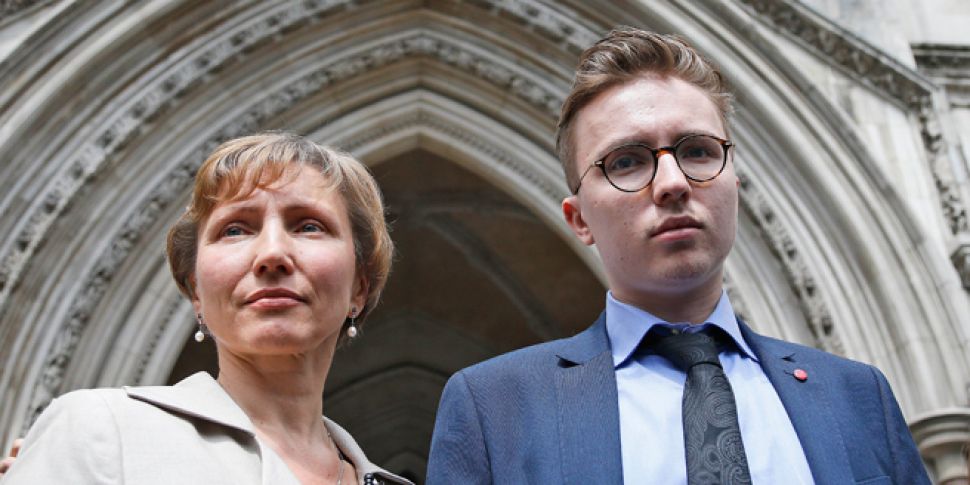Russian dissident Alexander Litvinenko was "deliberately poisoned" in an operation "probably" approved by Vladimir Putin, a British public inquiry has found.
Robert Owen, the head of the long-running investigation, said it was likely the Russian president signed off the killing of the former spy following a lengthy feud.
In the 300-page report, Mr Owen said Dmitri Kovtun and Andrei Lugovoi were probably acting under the direction of Russia's FSB intelligence service when they poisoned Mr Litvinenko with radioactive polonium at a London hotel in November 2006.
On his deathbed the fierce critic of the Kremlin, who fled Russia six years before his murder, pointed the finger at Mr Putin - and named former colleagues Dmitri Kovtun and Andrei Lugovoi as the men who poisoned him.
Speaking outside the High Court in London, Mr Litvinenko's widow Marina said she was "very pleased that the words my husband spoke on his deathbed when he accused Mr Putin have been proved by an English court".
Both Lugovoi and Kovtun deny involvement in the murder and Russia has refused requests to have them extradited to the UK.
Britain's Metropolitan Police said after the report was published: "There are outstanding warrants for Andrei Lugovoi and Dmitri Kovtun who remain wanted for this murder. Our objective will always be to put them before a criminal court".
An official for British Prime Minister David Cameron said the UK government was taking the findings "extremely seriously" and that Mr Cameron found them "extremely disturbing".
The Russian ambassador was summoned to the UK Foreign Office, and said after the meeting that the report, which he labelled a "gross provocation", would only hurt relations between the two countries.
The UK Home Secretary Theresa May revealed the British Treasury has agreed to impose asset freezes on Lugovoi and Kovtun in the wake of the report's findings.
Russia response
The Kremlin has always denied any involvement in Mr Litvinenko's death, and on Thursday claimed the public inquiry was "politically motivated".
Lugovoi said the accusations against him were "absurd".
He told Russia's Interfax news agency: "The results of the inquiry published today confirm once more an anti-Russian position of London, narrow-mindedness and unwillingness of English people to find a real reason of Litvinenko's death".
Moscow has condemned the report as "biased" and "politically motivated".
Russian foreign ministry spokeswoman Maria Zakharova also described the UK's handling of the case as "opaque" and said it had damaged ties between London and Moscow.
She added: "We lament the fact that a purely criminal case has been politicised and put a strain on our bilateral relationships".
"It is obvious that the decision to stop the coroner's investigation and start public hearings had a politicised basis".
"The reason is clear - the process, despite its name, is not transparent neither for the Russian side nor for the public, taking in mind that some of the documents were not published due to 'secrecy'".
"We therefore didn't have reasons to expect that the results of this politicised and opaque inquiry, that was from the beginning trying to lead to a 'wanted' result, would suddenly become objective and unbiased."
Mr Litvinenko's work for British intelligence, criticism of the FSB and Mr Putin, and his association with other dissidents such as Boris Berezovsky were pointed to by Mr Owen as likely motives.
There was also "undoubtedly a personal dimension to the antagonism" between Mr Putin and Mr Litvinenko.
The tensions dated back to their only face-to-face meeting in 1998, when Mr Putin was head of the FSB and Mr Litvinenko was pushing for reforms of the intelligence service.
He made "repeated highly personal attacks" on Mr Putin after seeking asylum in the UK in 2000, including an allegation of paedophilia in July 2006.
Mr Owen said: "I am satisfied that in general terms, members of the Putin administration, including the president himself and the FSB, had motives for taking action against Litvinenko, including killing him, in late 2006".
Although the evidence was "circumstantial", other cases suggested that "in the years prior to Litvinenko's death the Russian state may have been involved in the assassination of Mr Putin's critics".
Mr Owen said he was "sure" the murder had been carried out by Lugovoi and Kovtun, and the report said there was an earlier attempt by them to poison Mr Litvinenko at a meeting in London in October 2006.
There have been fears linking the killing directly to Mr Putin could place a fresh strain on relations between London and Moscow.
In her statement outside court, Mrs Litvinenko called on Mr Cameron to impose "targeted economic sanctions and travel bans" against individuals, including Mr Putin.
Mrs Litvinenko also said she wanted all Russian intelligence operatives based at the London embassy to be expelled.









